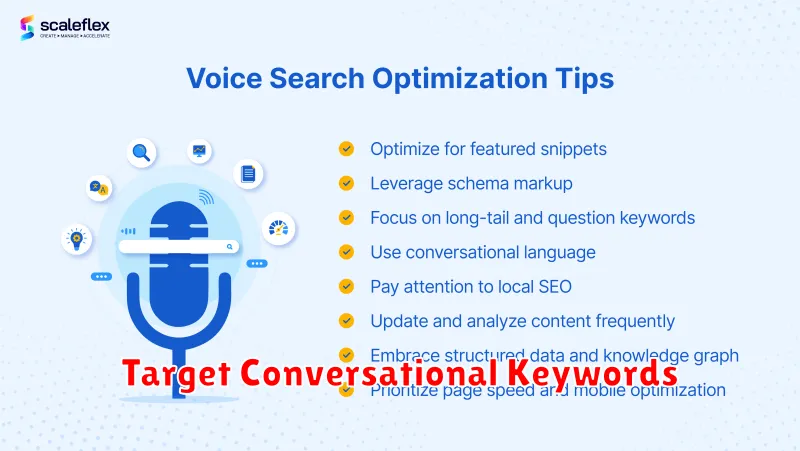In today’s digital landscape, voice search has emerged as a prominent method for users to access information online. With the rise of virtual assistants like Siri, Alexa, and Google Assistant, optimizing content for voice search has become crucial for businesses and content creators alike. This article explores the essential strategies for voice search optimization, enabling you to tailor your content to capture the growing audience using voice search. Understanding how people formulate voice search queries differs significantly from traditional text-based searches, and adapting your content accordingly is key to enhancing your visibility and reaching a wider audience.
Voice search optimization requires a nuanced approach that goes beyond traditional SEO practices. By focusing on conversational language, long-tail keywords, and providing concise, direct answers to user queries, you can significantly improve your chances of ranking prominently in voice search results. This comprehensive guide will delve into the practical techniques for optimizing your content for voice search, including structuring your content for featured snippets, optimizing for local voice searches, and leveraging schema markup to enhance your content’s discoverability. Mastering these techniques will empower you to effectively connect with users engaging in voice search and drive valuable traffic to your website.
Rise of Voice Search Usage
The utilization of voice search has experienced significant growth in recent years. This rise is largely attributed to the increasing prevalence of smart speakers, smartphones, and other voice-activated devices in our daily lives. These technologies offer a convenient and hands-free way to search for information, make calls, and control other devices.
Convenience is a key factor driving this trend. Voice search eliminates the need for typing, making it a faster and more efficient method of querying, especially on mobile devices. Furthermore, improvements in natural language processing (NLP) and speech recognition technologies have made voice search more accurate and reliable, leading to a more seamless user experience.
The increasing adoption of voice search has significant implications for businesses and content creators. Optimizing content for voice search is no longer optional, but rather a necessity for maintaining visibility and reaching target audiences. As voice search continues to evolve, understanding user behavior and adapting content strategies will be crucial for success in the digital landscape.
Target Conversational Keywords

Voice search queries are fundamentally different from text-based searches. Users speak naturally, using conversational language. Therefore, optimizing for voice search requires targeting conversational keywords, which are longer, more specific, and phrased as questions or complete sentences.
Think about how people speak in everyday life. They ask questions like, “Where’s the nearest coffee shop?” rather than typing “coffee shop near me”. These long-tail keywords are crucial for voice search optimization. Consider the user’s intent behind the search and focus on keywords that reflect that intent.
Focus on question keywords starting with who, what, where, when, why, and how. These question-based keywords are common in voice search and reflect the user’s desire for immediate answers. Additionally, include location-based keywords, particularly if your business caters to a local audience. Voice searches often include location modifiers like “near me” or a specific city name.
Use FAQ Sections Strategically
FAQ sections play a crucial role in voice search optimization. Structuring your content with a dedicated FAQ section allows search engines to easily identify and understand the questions and answers related to your topic. This increases the likelihood of your content being surfaced as a rich snippet or featured snippet, which are often used to answer voice search queries directly.
When creating your FAQs, focus on long-tail keywords, which are longer, more specific phrases people typically use in voice searches. Think about the questions your target audience might ask and use natural, conversational language in both the questions and answers.
Optimizing each question and answer with relevant keywords helps search engines understand the context of your content. Additionally, using schema markup, specifically FAQ schema, further enhances the visibility of your FAQ section to search engines. This structured data helps search engines better understand the content and format of your FAQs, increasing the chances of them appearing in voice search results.
Improve Page Load Speed
Page load speed is a critical factor for both user experience and search engine optimization (SEO), especially in the context of voice search. Voice search users expect instant answers, and slow-loading pages can lead to a poor user experience and higher bounce rates.
Search engines like Google consider page speed as a ranking factor. Faster loading pages are more likely to rank higher in search results, increasing their visibility to voice search users. Therefore, optimizing your website’s speed is essential for improved voice search performance.
Several factors contribute to slow page load times, including large image sizes, unoptimized code, and excessive HTTP requests. Addressing these issues can significantly improve your website’s speed.
Implement Schema Markup

Schema markup, also known as structured data, helps search engines understand the context of your content. It provides explicit clues about the entities and relationships mentioned on your webpage. This enhanced understanding allows search engines to deliver more relevant results for voice searches, as they can better grasp the user’s intent.
By using schema markup, you can provide specific details about your business, including your address, phone number, and business hours. For articles, you can mark up the author, publishing date, and other key information. This helps voice assistants provide accurate and concise answers to user queries.
There are various schema types available, covering a wide range of content, from products and services to events and recipes. Choose the schema type that best matches your content to maximize its effectiveness. Tools like Google’s Structured Data Markup Helper can assist you in implementing schema markup correctly.
Create Localized Content
Voice search queries often include location-based information. Users frequently search for businesses “near me” or specify a particular city or region. Therefore, it’s crucial to optimize your content for local search.
This involves incorporating location-based keywords throughout your content. Mention specific neighborhoods, landmarks, or regions relevant to your business. For example, instead of saying “best Italian restaurant,” try “best Italian restaurant in Brooklyn.” This helps search engines understand the geographic relevance of your content and serve it to users searching in that area.
Furthermore, ensure your business information is accurate and consistent across all online platforms, including your website, social media profiles, and online directories. This includes your name, address, and phone number (NAP). Consistency helps build trust with search engines and improves your local search ranking.
Track Voice Search Queries
Tracking voice search queries is crucial for understanding user behavior and optimizing content effectively. While direct access to voice search keywords isn’t always readily available through platforms like Google Search Console, there are valuable methods to gain insights.
Indirect Tracking Methods:
- Analyze website traffic data: Look for increases in organic traffic alongside queries phrased as questions. This suggests potential voice search activity.
- Review search query reports: Identify question-based keywords within search console data, even if not specifically tagged as “voice search,” they offer valuable clues.
- Utilize keyword research tools: Many tools offer insights into question-based keywords and their search volume, providing indirect indicators of voice search trends.
Focus on Long-Tail Keywords:
Voice searches tend to be longer and more conversational. Prioritize optimizing for long-tail keywords that reflect natural language patterns.

